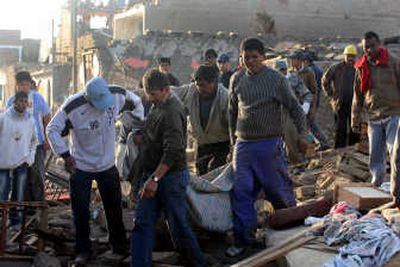Peru pleads for aid after quake

PISCO, Peru – Peru’s prime minister pleaded for emergency aid – “even coffins” – as the toll from the strongest earthquake to hit this country in 35 years climbed Thursday to 510 dead, at least 1,550 injured and tens of thousands homeless.
With both the hospitals and a crowded 18th-century church in this city of 130,000 destroyed, two dozen people were being treated on a concrete soccer field across the street from one of the hospitals.
Virtually every block of Pisco appeared to have sustained damage, especially houses and walls made of sun-dried mud bricks. Many residents wandered without purpose, some sobbing, some carrying their belongings, all apparently dazed by the level of destruction.
“We need everything, even coffins,” said Prime Minister Jorge del Castillo, who was accompanying President Alan Garcia on a tour of the damage. Across the street from where he stood, 49 bodies were laid out in the main city square.
Officials said 80 doctors were sent to Pisco, and that authorities were flying injured people to the capital city of Lima from Ica, the southern province nearest to the epicenter.
Police were out in force to avert possible looting, and the government was sending in food, water and gas stoves, as well as eight large electric generators and a Peruvian hospital ship loaded with food and other supplies.
Some foreign tourists were rescued from the Hotel Paracas, 10 miles from Pisco.
In Washington, President Bush expressed his condolences, and the White House announced that a U.S. team already in Peru would assess the damage and arrange aid.
“Basically, we need blankets, water, donations of money,” said del Castillo. “There is collective hysteria here.”
Paulo Grimaldo was one of those outside the 18th-century San Clemente church Thursday afternoon, hoping against hope that his wife, three children and granddaughter had somehow survived its collapse.
“Unless there is a miracle, my only hope is getting a final opportunity to see their bodies,” he told the Miami Herald.
The U.S. Geological Survey raised the magnitude of the quake from 7.9 to 8.0 Thursday and said at least 15 aftershocks followed, some as strong as 6.3. The quake’s epicenter was about 90 miles south of Lima and off the Pacific coast of Ica, a state that includes Pisco and the nearby city of Chincha.
Bruce Presgrave, a spokesman at the U.S. government’s National Earthquake Information Center, said Wednesday night’s earthquake was the third biggest of the year worldwide. Only earthquakes of 8.1 magnitude off the coasts of Russia and Australia were bigger.
Shocked residents of Chincha, where adobe homes collapsed and spilled bricks into the street, gathered household belongings and piled them outdoors as they sat on couches and chairs to wait for help.
“Everything is damaged. We can’t live here now,” said Edilberto Yeren. The roof of his home and two walls caved in, but his family of eight escaped unhurt. “We have to reconstruct the house. What else can we do?”
President Garcia declared the province of Ica an emergency zone, and aid was rushing to the area, but traffic was paralyzed by massive cracks in the Panamerican Highway south of Lima.
The road from Chincha to Pisco was lined with dozens of parked buses and cars waiting to cross a bridge on its one undamaged lane.
Reports from Radio Programas del Peru said that damage from the earthquake allowed all but 50 inmates to escape from a prison in Tambo de Mora, near Chincha. The facility held 683.
In Miami, planners at the Pentagon’s Southern Command said they were studying what kind of humanitarian aid it might provide – including perhaps sending the U.S. Navy hospital ship Comfort to assist in relief efforts. The ship, on a goodwill medical mission in the region, was in Manta, Ecuador, on Thursday.
The main two-lane highway linking Lima with Ica was cracked in many places, limiting traffic to one lane.
“Big rocks fell off the side of the earth. I thought my life was over,” said Eugenia Imara Marino, 45, who lives in a valley in San Juan, a town south of Lima.
She shares a one-bedroom wooden home with her three children and her father. Just as she ran the water to take a bath Wednesday night, the floor beneath her shook and the walls looked ready to collapse. She looked outside and saw rocks falling.
“I don’t have anything. My house is worth pennies,” Imara Marino said in a telephone interview Thursday. “I immediately started thinking about my son and my daughters. We were going to die.”
As plates fell off a table, her 78-year-old father collapsed. “He said he felt the room spinning,” she said. “I kept on telling him to stay calm, but how could he? I was a disaster as well.”
When the earthquake stopped she went outside, where she heard people screaming and crying.
“People poured into the streets just waiting,” Imara Marino said, her voice still trembling a day later. “The crying went on into the night.”